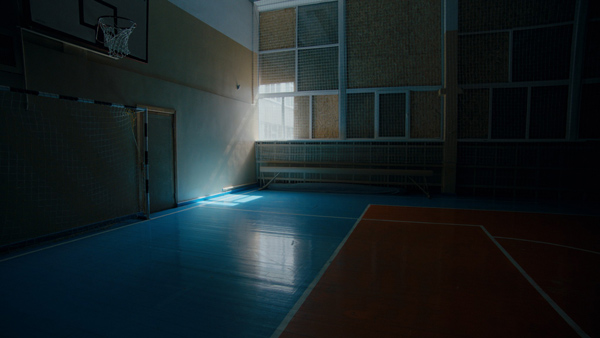Schools of Survival: Gornostai Probes the Resiliency of Ukraine’s Education System During Wartime
 Despite reflecting the distressing normalization of wartime on an entire generation of Ukraine’s youth, there’s a semblance of hopefulness in Kateryna Gornostai’s Timestamp, a documentary which was shot across 2023/2024 throughout the country as Russia’s continued aggression re-shapes day-to-day experiences. What’s hopeful remains in the resiliency of ongoing education for children who aren’t able to attend in-person classes, either because of ongoing air raids or, in some cities, where school houses have not yet been rebuilt. A self-professed mosaic presentation, the film drifts between various Ukrainian cities, confirming their status as liberated or destroyed, as well as their distance from ongoing war zones.
Despite reflecting the distressing normalization of wartime on an entire generation of Ukraine’s youth, there’s a semblance of hopefulness in Kateryna Gornostai’s Timestamp, a documentary which was shot across 2023/2024 throughout the country as Russia’s continued aggression re-shapes day-to-day experiences. What’s hopeful remains in the resiliency of ongoing education for children who aren’t able to attend in-person classes, either because of ongoing air raids or, in some cities, where school houses have not yet been rebuilt. A self-professed mosaic presentation, the film drifts between various Ukrainian cities, confirming their status as liberated or destroyed, as well as their distance from ongoing war zones.
War broke out across Ukraine on February 24, 2022, while several regions had already been experiencing Russian aggression since eight years prior. But as conflict zones moved, certain liberated areas were able to resume education programs for the children—although this looks different depending on the level of damage. Online and in-person programs (and sometimes inventive hybrid options) have allowed teachers to stay connected with students and their continuing education, which also includes training them with methods for survival.

Gornostai previously documented Ukraine’s contemporary trajectory in her 2013 medium length documentary Euromaidan. Chornovy montazh, where the country’s suspended attempts to access the EU started a chain of events, including the Russian invasion of Crimea in early 2014. Some of the students depicted in this latest documentary live in regions where this conflict has now been going on for over a decade. Part of their education involves learning combat training and various survival skills, which seems startling as target practice and weapons training become part of a physical education curriculum. But Gornostai’s methods are purely observational. A majority of the sequences depict rituals and traditions attempting to be upheld despite interruptions. Graduation ceremonies, for instance, some of which have to take place online, contain hopeful messages about better things to come. Children perform song and dance numbers at various events, some with highly topical lyrics which would seem despairing within any other context.
One of the more distressing moments involves a young girl walking into a school library and breaking down in tears when she sees a framed photograph of her deceased father on a wall of commemoration. “Show him how well you read,” her teacher advises as a way to comfort her. In the decade since the annexation of Crimea, there have been several well-traveled documentaries detailing the ongoing war, including 2023’s 20 Days in Mariupol. But Gornostai focuses specifically on the collateral damage of children, which, as the title suggests, creates a film which plays like a nightmarish time capsule, except one there’s no distance from. Premiering at a time when it would appear there will be more trouble ahead for Ukraine based on recent drastic shifts in the chaotic political landscape of the United States, Timestamp will likely not feel ‘of the moment’ for long. And while it contains powerful imagery, Gornostai isn’t digging too deeply into the mechanics of the education system, more so showcasing the resilient evolution of a besieged population.
Reviewed on February 20 at the 2025 Berlin International Film Festival (75th edition) – Main Competition. 125 mins.
★★½/☆☆☆☆☆


